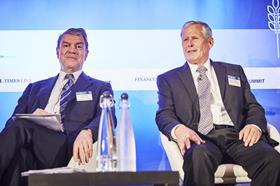
Don Cameron is vice president and general manager of Terranova Ranch in the San Joaquin Valley, California. The farm grows a wide range of fruit, veg and nuts, including peppers, melons, wine grapes and almonds, with production ranging from conventional, organics and biotech.
In 2011, the ranch trialled a pioneering drought mitigation technique called groundwater recharge, to capture and distribute floodwater onto crops and keep them submerged for up to three months. This is helping to recharge the farm’s groundwater and primary irrigation source, and is becoming a necessary protection against increasingly extreme drought and high temperatures. Cameron was interviewed on stage at the FT Future of Agriculture Summit, held in London on 10 October, by Financial Times science editor Clive Cookson.
What impact have you seen from climate change so far and how are you becoming more resilient?
They might not have climate change in Washington but we definitely have climate change in California. We didn’t have a pistachio crop a couple of years ago because there weren’t enough chill hours over winter. We’re seeing extreme heat, drought and extreme flooding. We’re seeing lots of extremes, but also generally higher temperatures.
We are using groundwater recharge via flooding so we can make it through the drought. We’re also looking at different varieties of crops that can withstand different scenarios, and we’ve been trying to change our planting and harvesting patterns to take advantage of warmer temperatures.
How do crops respond to groundwater recharge?
There hadn’t been too much done on this by universities, so we were on our own when we started. Initially grape vines turned bright yellow, then we drained the area and they went green again. We’ve tried it on almonds, pistachios, olives for olive oil, and grapes are the only ones with an issue. We’ve now partnered with (post-harvest university) UC Davis, and we’ve had a lot of people take notice.
How does this technique fit into the Californian ‘water wars’?
What we’re dong with groundwater recharge is changing the groundwater conditions. We have more storage for water under our feet. Years ago this area would have flooded, so we are essentially reconnecting the flood water with the plains.
What issues are you facing around labour?
In context of Trump’s efforts to reduce the Latino immigrant population, our workers are nervous. In California, the agriculture industry relies on workers from Mexico. Around 65 per cent of workers are undocumented, is the number I hear. We’ve seen the border is getting tighter, and we’ve heard that the cost of crossing the border is increasing. There is a worker programme that brings workers in for agriculture, but it’s cumbersome and not widely used.
We’re looking to automation for the future, but there will always be a niche for hand-harvested food. There were talks of a blue visa scheme to allow us the workers we need, but with the current climate in Washington we’re not holding our breath.
How do you see farming developing in the future?
Silicon Valley has discovered the farm as ‘the new frontier’, so we get a lot of people offering us solutions for problems we don’t have. I look at climate change and if it happens as rapidly as expected, we’re going to need new varieties. I think GM and gene editing will have a real place in our future.
Terranova now produces around 25 different crops, why did you choose to diversify?
We became specific in adding diversity for several reasons. It gave us financial stability in offsetting risk in individual crops – there is always one crop that struggles. We also don’t have the insect pressure that we used to get with only growing two or three crops. It keeps our workforce busy all year round, stabilises our employment, stablises our income, it’s been really good.
How do you choose to make these forward-thinking and innovative decisions?
There is risk involved. Even this year, we weren’t sure if we were going to kill crops using the groundwater recharge. But what we’ve found is that 70 per cent of the water moves down to the water table. The decisions we made were about survival. We look at a flood as an opportunity.
How does Brexit look to you and do you seen an opportunity for trade?
It’s fascinating to watch. I wondered which country would be the first to exit the EU, it’s interesting that Britain was the first one.
How is farm ownership and succession planning changing in California?
I think we will see more consolidation. Management companies are getting involved with a blueprint for future businesses. We’re seeing a lot of retirement and insurance firms getting into farming, they don’t mind the less predictable returns. They’re getting into farming across the US. So much of the area is still family-owned farms, but we’re seeing a lot of change.



